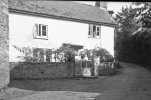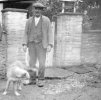B
Beryl M
Guest
An excerpt taken from my story
"When I climbed out of bed Friday September 1 1939, German troops were making their way across the border into Poland! September 3 1939 Britain declared on Germany and the horror of parents listening to the news that Germany had torpedoes the 13,.500 ton passenger liner :”Athenia” on route from Glasgow to Quebec, Montreal.1,130 passengers aboard, 118 lost their lives many of them children. This caused such a furor that Hitler ordered there would be no more attacks on passenger ships, no matter what the nationality!
That summer had been a hot one mom took us on a picnic to Stratford where Shakespeare was born and in August a holiday to Seaton a coastal seaside place in Devon, well known for its cider and clotted cream. Dad was away with the Air force, but being in the reserve was called up before things started to happen.
I was relatively a happy child, but life for everyone slowly began to change: Air raids started and the Germans began dropping their bombs, everyone was issued with gas masks, and smaller children like my Mickey Mouse gas masks and in every other garden an Anderson air-raid shelter were assembled. Within a few weeks the evacuations of thousands of children from London Birmingham and other big cities began. It was an operation that would have a profound effect on many of us later on in life. We were uprooted from our homes and dispatched to live with strangers some of us for a few years!
There was abuse not all children were welcome in families that took us in and I certainly had my share of rough treatment from some! However, it must be said, the independence forced on us at such an early age gave us an education - an appreciation of life’s incongruities no school could have provided.
Children with name tags pinned to coats, carrying gas masks, suit cases or shopping bags containing their belongings, teachers carried placards with the name of their school, came from all over snaking their way to bus stops and railway stations Tearful parents saying good bye to their kids wondering where they would be sleeping that night. As I boarded the train biting my lip I waved good bye with my handkerchief like the rest of the children till our parents standing on the platform were out of sight!'
"When I climbed out of bed Friday September 1 1939, German troops were making their way across the border into Poland! September 3 1939 Britain declared on Germany and the horror of parents listening to the news that Germany had torpedoes the 13,.500 ton passenger liner :”Athenia” on route from Glasgow to Quebec, Montreal.1,130 passengers aboard, 118 lost their lives many of them children. This caused such a furor that Hitler ordered there would be no more attacks on passenger ships, no matter what the nationality!
That summer had been a hot one mom took us on a picnic to Stratford where Shakespeare was born and in August a holiday to Seaton a coastal seaside place in Devon, well known for its cider and clotted cream. Dad was away with the Air force, but being in the reserve was called up before things started to happen.
I was relatively a happy child, but life for everyone slowly began to change: Air raids started and the Germans began dropping their bombs, everyone was issued with gas masks, and smaller children like my Mickey Mouse gas masks and in every other garden an Anderson air-raid shelter were assembled. Within a few weeks the evacuations of thousands of children from London Birmingham and other big cities began. It was an operation that would have a profound effect on many of us later on in life. We were uprooted from our homes and dispatched to live with strangers some of us for a few years!
There was abuse not all children were welcome in families that took us in and I certainly had my share of rough treatment from some! However, it must be said, the independence forced on us at such an early age gave us an education - an appreciation of life’s incongruities no school could have provided.
Children with name tags pinned to coats, carrying gas masks, suit cases or shopping bags containing their belongings, teachers carried placards with the name of their school, came from all over snaking their way to bus stops and railway stations Tearful parents saying good bye to their kids wondering where they would be sleeping that night. As I boarded the train biting my lip I waved good bye with my handkerchief like the rest of the children till our parents standing on the platform were out of sight!'
Last edited by a moderator:


